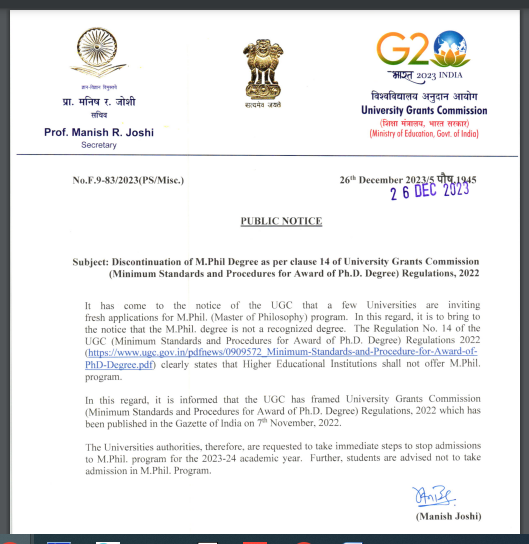
The commission had previously declared that the MPhil degree program provided by all universities will no longer be considered valid.

Old Notification: https://www.ugc.gov.in/pdfnews/2954328_Public-Notice—Ph.D.-M.Phil-in-ODL.pdf
Latest Notification:
The University Grants Commission (UGC) has issued a notification cautioning students regarding universities that continue to admit students into the MPhil (Master of Philosophy) program. This warning is prompted by the fact that several universities are still enrolling students in the MPhil degree, despite the UGC’s earlier decision to discontinue the course.
The commission had previously declared the MPhil degree invalid across all universities, instructing higher educational institutions not to offer MPhil programs. Additionally, university authorities have been directed to promptly halt admissions to the MPhil program for the academic year 2023-24.
In an official notification, the UGC stated, “It has come to the attention of the UGC that certain universities are actively seeking new applications for the MPhil (Master of Philosophy) program. It is important to note that the MPhil degree is not officially recognized. As per Regulation No. 14 of the UGC (Minimum Standards and Procedures for Award of PhD Degree) Regulations 2022, Higher Educational Institutions are prohibited from offering MPhil programs.”

Latest Notification: https://www.ugc.gov.in/pdfnews/4252197_Public-Notice-for-discontinuation-of-M-Phil-course.pdf
In summary, the UGC has cautioned students against pursuing MPhil due to universities continuing to offer the program despite its cancellation. Universities have been instructed to cease admissions for the 2023-24 MPhil academic year in accordance with UGC guidelines. An official notification emphasizes the non-recognition of MPhil, referencing UGC regulations from 2022.
What was MPhil
Duration:
M.Phil. programs in India typically have a duration of 1 to 2 years, depending on the university and discipline.
Eligibility Criteria:
Candidates usually need to have a postgraduate degree in a relevant field with a minimum percentage or equivalent grade as specified by the university.
Admission Process:
Admission to M.Phil. programs often involves an entrance examination and/or an interview. Some universities may also consider the candidate’s performance in their postgraduate studies.
Research Emphasis:
M.Phil. programs are research-oriented, and students are required to submit a thesis or dissertation based on their research work.
Fields of Study:
M.Phil. programs are offered in various disciplines, including Humanities, Social Sciences, Science, Engineering, and more.
University-Specific Requirements:
Each university may have its own specific requirements, curriculum, and areas of specialization for M.Phil. programs.
Thesis Evaluation:
Evaluation of the M.Phil. thesis is a crucial component of the program, and students need to defend their research work during the viva voce examination.
Continuation to Ph.D.:
Many students pursue M.Phil. as a precursor to a Ph.D. program. Successful completion of an M.Phil. program may make them eligible for direct entry into a Ph.D. program in some cases.
Fellowships and Scholarships:
Some universities offer fellowships or scholarships to M.Phil. students based on merit or other criteria.
Regulatory Bodies:
The University Grants Commission (UGC) is a regulatory body in India that provides guidelines and sets standards for M.Phil. programs.
Read Daily Current Affair MCQs









Leave a Reply